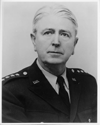In Retirement
Wedemeyer strongly professed a believe in the purity of General Marshall’s motives in his assessment of the China policy, but thought Marshall had come to the wrong conclusions and had lost sight of the long range interests of the United States, because of a number of factors including his exhaustion from his superlative war efforts, his incessant pounding from critics, his “…getting on in years,” and finally his implicit faith in the reports of his old friend General Stilwell, who ascribed all the problems in China to the government of Chiang Kia-shek. Further, although both he and Marshall were career military men, Wedemeyer obviously thought his experience, training, study, and particularly his exposure to Communism both in Germany and then in China better equipped him to understand the menace. Wedemeyer wrote in 1958:
General Marshall was primarily a military man who had little knowledge of the complexities of the world conflict and no conception of the skill with which the Communists pervert great and noble aspirations for social justice into support of their own diabolic purposes. Moreover, by the time he arrived in China on his fatal mission, George Marshall was physically and mentally too worn out to appraise the situation correctly. Finally, as I hate to admit because I never revered anyone more than General Marshall, he was not immune from the besetting sin of most human beings who rise to the heights of power or influence.
Copyright © 2007 - 2025. All Rights Reserved.
Original Coding by Goimage Media Services

